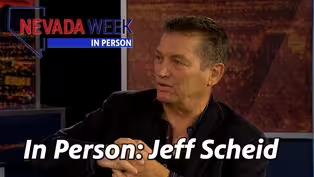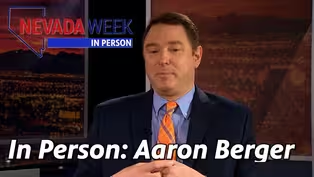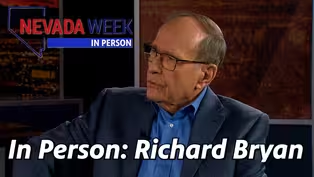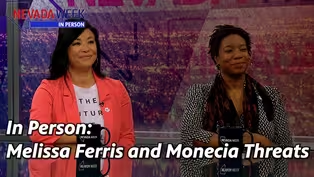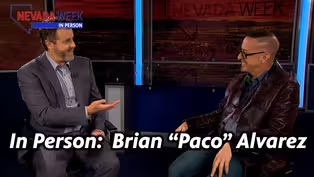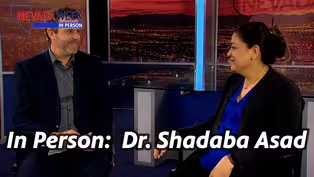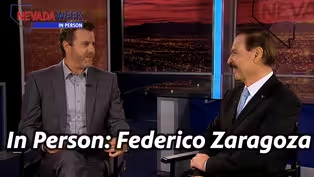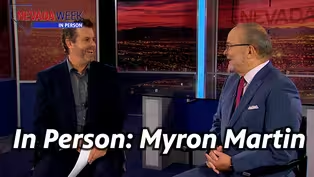
Nevada Week In Person | Bo Bernhard
Season 1 Episode 1 | 14mVideo has Closed Captions
An in-depth conversation with Bo Bernhard from UNLV about his work with the university.
We talk with Bo Bernhard from UNLV about Black Fire Innovation, his role at UNLV and UNLV’s role in the economic recovery of Las Vegas.
Problems playing video? | Closed Captioning Feedback
Problems playing video? | Closed Captioning Feedback
Nevada Week In Person is a local public television program presented by Vegas PBS

Nevada Week In Person | Bo Bernhard
Season 1 Episode 1 | 14mVideo has Closed Captions
We talk with Bo Bernhard from UNLV about Black Fire Innovation, his role at UNLV and UNLV’s role in the economic recovery of Las Vegas.
Problems playing video? | Closed Captioning Feedback
How to Watch Nevada Week In Person
Nevada Week In Person is available to stream on pbs.org and the free PBS App, available on iPhone, Apple TV, Android TV, Android smartphones, Amazon Fire TV, Amazon Fire Tablet, Roku, Samsung Smart TV, and Vizio.
Providing Support for PBS.org
Learn Moreabout PBS online sponsorshipMore from This Collection
Nevada Week In Person goes beyond the roundtable discussion of Nevada Week with guests for a more casual conversation about their personal passions, new projects and compelling stories that are overlooked in the flurry of the news cycle.
Nevada Week In Person | Jeff Scheid
Video has Closed Captions
A one-on-one interview with longtime Southern Nevada photojournalist Jeff Scheid. (14m)
Nevada Week In Person | Aaron Berger
Video has Closed Captions
We talk with the executive director of the Neon Museum, Aaron Berger. (13m 59s)
Nevada Week In Person | Richard Bryan
Video has Closed Captions
Retired Nevada Senator Richard Bryan talks about his life in service of the state. (14m)
Nevada Week In Person | Monecia Threats and Melissa Ferris
Video has Closed Captions
Monecia Threats and Melissa Ferris talk sports in Las Vegas. (14m)
Nevada Week In Person | Brian ‘Paco’ Alvarez
Video has Closed Captions
A personal interview with arts and culture curator Brian ‘Paco’ Alvarez. (14m)
Nevada Week In Person | Dr. Shadaba Asad
Video has Closed Captions
Infectious disease expert Dr. Shadaba Asad on the coronavirus pandemic. (14m)
Nevada Week In Person | Federico Zaragoza
Video has Closed Captions
An in-depth and personal conversation with CSN President Federico Zaragoza. (14m)
Nevada Week In Person | Myron Martin
Video has Closed Captions
An in-depth personal discussion with Smith Center CEO Myron Martin. (14m)
Providing Support for PBS.org
Learn Moreabout PBS online sponsorship♪♪♪ Support for Nevada Week In Person is provided by Senator William H. Hernstadt and additional supporting sponsors.
(Kipp Ortenburger) The Global Gaming Expo returned in person to Las Vegas this week.
It marked an important turning point for an industry recovering from the pandemic.
Well, joining us to talk about the gaming industry, UNLV's role in pushing forward that industry and the greater university's role in helping diversify our economy is Bo Bernhard, interim vice president of economic development at UNLV.
He also serves as the executive director of UNLV's International Gaming Institute.
Now, in his newest role, he's responsible for monetizing the research conducted by UNLV, utilizing collaborative ventures like the recently launched Black Fire Innovation lab.
Bo, welcome.
-Good to be back.
-Yes, absolutely, and we'll talk about Black Fire.
I know you're super excited about that.
You've given tours, I don't know, every day.
-Yes.
It's a rock star facility.
-But can we start with room-temperature superconductivity first.
(Bo Bernhard) We can.
So one of the amazing things, and unfortunately it happened right as other scientific advances like the vaccines came out, but over on Maryland Parkway a few blocks away from where we are right now, a scientist named Ash Salamat at UNLV, he's a physicist, he came to us from Harvard, and he achieved room-temperature superconductivity.
We live in a semiconducting world, and for most of our technological history, that's where we've been and the big companies are semiconducting companies.
Superconducting is something that connotes that you move energy from point A to point B.
So all the cords in this place, right, are moving energy from point A to point B with no loss of energy for the first time in human history.
And so it had happened actually at minus 400 degrees because of course it involves a loss of heat, but we did it at room temperature just a few blocks away, and it changes everything, literally every device we touch.
-Everything.
So I want to come back to monetizing this research, because it seems like if you have something that's very small, it would be hard-- the challenge would be in monetizing maybe something like that, but this is universal to everything which brings on maybe new challenges, being able to monetize research like that; how do you do that?
-Yes, it really is a huge challenge, and we have tremendous support from the governor who mentioned this in his State of the State as an opportunity for us to diversify the economy, right?
This is something that could be as big as of course our big industry is because it touches every industry and every device.
And so yes, that's our job at this point is taking that science, translating it first into a product and commercializing that in a way that benefits the world.
-Let's talk about diversifying our economy more so.
You said our big industry, central is of course gaming and hospitality.
You have said that Las Vegas presents in that industry a great jumping-off point for quote, "degrees of separation and economic development "in growth and diversification."
What do you mean by that first off?
-So it's kind of like the "six degrees of Kevin Bacon" thing if you're familiar with that where you can connect any actor to Kevin Bacon through six connections, right?
So we'll take the Strip, right, as our jumping off point.
The Raiders represent one degree of economic diversification.
They're taking full advantage of the 150,000 hotel rooms, the massive infrastructure that gets 42 million visitors here every year, but they are an entirely new industry that represents one degree of diversification.
However, they're close enough that they still got pretty beat up by COVID, right, which is what we're looking to do is become more resilient, more robust.
However from the Raiders, you get industries that diversify from that like sports medicine, right?
We have a brand new medical school at UNLV.
This is one of the areas our kinesiology department works very closely with our med school on, and that represents sort of two degrees of diversification.
And then you get robots that help, you know, sports medicine approaches, right?
And by the time you get to robots, you can't even see the Strip from there, right?
However, no industry has diversified alone.
Each of those diversification moments happen with the support of existing businesses, existing infrastructure, so it's not just like planting a seed out in the desert and hoping that it grows.
-Yes, it makes sense.
But I mean, what synergy do we have as a state?
When we usually talk about economic diversification, we think of manufacturing, right?
We think of what was going on maybe in Apex and bringing a new industry here, diversifying that way.
This makes a lot more sense; is the state on board?
-I think we are.
I think we all got on board when the lights literally went out on the Strip during COVID, right?
I don't know if you did what I did where, you know, there were days of course where you could drive the Strip and it looked like a zombie movie.
-I rode a bike down the Strip.
-Yes, and it was-- it was visceral, right, for all of us who live here.
And I think gosh, that hammered home the realization that we have to be more than this.
We have to be this, right?
This is our brand; this is who we are.
We have to water the green spot that is the Strip, but we also have to water the rest of our lawn and look at ways that we can diversify and become more resilient.
-Yes.
Let's talk about how gaming-- and this shouldn't be just gaming and hospitality, even entertainment is evolving before our eyes, and I mean, COVID is one of the reasons why.
We were both just talking in the green room about G2E, and one of the things that was very prominent in G2E this year is cashless gaming and digital payments, right?
Something that has produced from COVID, but let's talk about some of the more virtual technology here too.
So much is mobile now.
We've got virtual and augmented reality.
Your experience doesn't end when you check out of the Strip.
It's when you move to Sioux City-- you go back to Sioux City, Iowa and you can still experience the Las Vegas experience.
How are we capitalizing on that?
-Yes, I think a few things happened.
A lot of things happen during COVID, but a few that are relevant here, one is we are all gamers now, right?
We were all stuck at home, and even your grandmother was probably playing a game on her phone.
And if we as a place that offers games to the general public don't respond to that by going online, by moving into more mobile environments, then we're in deep, deep trouble.
You know, some of the other things that happened during COVID is remember how we used to use the word "germaphobe"?
That's not even a word anymore because we're all germophobes now, and technologies like cashless technologies that remove potential contaminants suddenly have a new energy, right?
The old joke was the only thing that was dirtier than the chips that we use in casinos are the cash bills that we actually use to exchange for those.
Poker players, for years we joked that if one person gets a cold in the poker room, everybody gets a cold.
Well, we're in an environment where that can no longer be the case, and we're working hard at Black Fire.
For example, we have a Leed Prize for Innovation winner who's invented a type of bedsheet that is completely sterilized with no use of water, and once more that reflects the new era we're in where we need those kinds of innovations that reflect our times.
-Yes, and let's talk about Black Fire because we're not just talking about gaming innovation and tech here, we are talking about the hospitality side of things too.
You mentioned this laundry-free linen here.
I mean, it sounds like something out of the Jetsons; name some others.
What are some other things that are being developed right now?
-Well again, I'd start with these linens.
It is really remarkable the degree to which of course water is consumed by the Las Vegas Strip that has to of course wash a whole lot of laundry.
These are the first waterless sheets.
What happens is they go downstairs to what used to be the laundry.
They go into a different machine.
They get melted into small white pellets and they then get reconstituted into a brand-new soft sheet, and they don't use any water in doing so, right?
And this is something that we were very proud to unveil and support through our Leed Prize for Innovation at UNLV.
But as you point out, there are so many different innovations there.
We have a group of UNLV scientists actually, they graduated from UNLV in like 2012, computer science kids who of course then went to Silicon Valley because in 2012, that was kind of what you did.
They always wanted to come back home.
Their company is called the AI Foundation, for artificial intelligence, and their motto is "We want to use "artificial intelligence for the good of humanity."
So they have these artificially intelligent avatars like Deepak Chopra, and it actually looks like you're FaceTiming with Deepak who endorses the product, and you can talk to him about your health and wellness, about your stress levels, about whether you're running into problems at work, and therefore whether you might want to do a meditation, right?
All of these kinds of technologies have a home in sort of a Silicon Vegas, if you will, over at Black Fire.
-Let's talk about the Silicon Vegas side of this too.
I mean not only Black Fire, and correct me if I'm wrong, Black Fire is kind of that last step.
But let's not forget that UNLV is an R-1 rated university, top level of research you can get for an institution of higher education, and then now we have an incubation hub, another big thing to these different stages of this.
The question is how close are we to being ready to be the next Silicon Valley?
-Yes.
Help is on the way, right?
And universities have always driven this kind of innovation and as the R-1 university for Southern Nevada, which is actually a really big deal.
We're a young university; it's like everything else in Las Vegas.
Really we only became independent from the University of Nevada Reno in 1969, and if you consider that as sort of our birth year, we're the youngest university in American history to achieve the top-tier ranking from the Carnegie Institute, which measures holistically your research productivity.
That's an amazing thing.
I've been at UNLV for two decades.
That never would have happened 10 years ago.
But now that we do have this engine, there are so many ways that this benefits our community, right?
I think a lot of folks enjoyed the benefits by taking advantage of our testing and vaccine services.
We have a brand-new medical school, an awesome nursing program, and the folks who went through the UNLV services saw the real obviously in the trenches, day-to-day benefits of having one of those in your backyard.
So having all these different academic fields, we're not just an ivory tower divorced from our communities.
We're able to contribute hopefully solutions to the problems of our day.
-I want to talk a little more personal here.
You are a fifth-generation Nevadan.
-Yes, I'm statistically weird.
(laughter) You are.
There aren't very many of you around.
You are, you're a unicorn.
You really are.
-That's a nice way to put it.
-But I was doing the math, right?
I mean, five generations goes back to the time of Fremont, and I gotta ask, was there a Bernhard that was maybe dragging the Fremont cannon from Oregon to Southern Nevada?
-I don't think we did anything important.
But from an innovation standpoint, we actually arrived here before the invention of air-conditioning which either makes you super gutsy or super dumb, right?
But that's an illustration, right?
Without the invention that is air-conditioning, right, for most of human history we obviously didn't have that and this valley was largely uninhabitable, at least by large numbers of individuals.
So it goes to show you how this is a place that's always benefited from inventing the next and hopefully creating new rides at our amusement park on Las Vegas Boulevard but also new kinds of lives out in our community.
-Yes, a great reference point.
Let's talk about some others, too.
I mean, you do have maybe because your roots are so much more formally rooted in Nevada itself, I mean, the depth and breadth you might have.
Give us some other perspectives, you know, that maybe we don't hear from somebody that is a fifth-generation Nevadan.
-I think, you know, a lot of folks-- I just went to my 30th high school reunion, and a lot of the people I grew up with, grew up in a small town, right?
It felt like we grew up in a small town that had nevertheless a pretty famous street in the middle.
But we felt like small-town people.
I don't think any of us ever imagined a place where the whole valley contained 2-1/2 million people, where the NFL brought one of the iconic franchises here.
I got to cut the ribbon on that day when we launched this new stadium just a couple of months ago, and I used to ride BMX bikes in that very same desert while I was, you know, chasing lizards and doing the things that desert kids do.
And I think it must feel the same for folks who grew up in Shanghai, right?
You look at these photos of Shanghai where it's 20 years ago it was largely flat, and now it's all towers, right?
The dizzying pace of change is something that you just don't see anywhere else, and you can either get excited about it or you can be a little daunted by it, and we had both at my high school reunion actually, it was interesting.
Many of us moved away.
-But still that small-town feel is still-- you know, we're still very well connected.
We're still very accessible.
It's interesting how that still is in our DNA.
-Yes.
I think when I was growing up, it used to be that you'd see everybody at halftime of the Runnin' Rebels basketball games as you went around the concourse.
Now certainly the Golden Knights have contributed that and the Raiders have contributed that, and a wide variety, right?
The Smith Center has contributed that, right?
So there really is, again, I think a sense of small town for those of us, even those of us that knew it when it really was a small town, and as a result, things can get done here because we all kind of know each other.
-Yes.
A new element of course this show is, but we're going to do kind of a little rapid fire here, kind of a one- or two-word answer to some of these questions, okay?
One word: What do we need more of here in Las Vegas?
-Water.
-Water.
One word: What do we need less of?
-Umm, pessimism.
-Hmm.
I wish we could expand on that a little bit.
(laughter) You said give me one word.
-Next big thing in Las Vegas, what's it going to be?
-Oh, good.
I really think it's in sports.
I think our portrayal-- our sending out to the world, our export if you will, of entertainment broadens to include sports in a way that it never did when I was growing up.
-Sports.
Wonderful.
Thanks, Bo.
-Thank you.
-Wonderful.
We want to thank Bo for joining us for a more in-depth look at G2E and Black Fire Innovation.
Check out Nevada Week at 5:30 p.m. on Sunday or 7:30 p.m. on Tuesday night right here on Vegas PBS.
You can also find us anytime on vegaspbs.org/nevadaweek.
Also, follow us on Facebook and Twitter at @nevadaweek.
Thanks a lot.

- News and Public Affairs

Top journalists deliver compelling original analysis of the hour's headlines.

- News and Public Affairs

FRONTLINE is investigative journalism that questions, explains and changes our world.












Support for PBS provided by:
Nevada Week In Person is a local public television program presented by Vegas PBS
